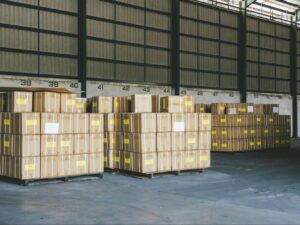Introduction
For companies that sell their products online, a fulfillment center is the place where the products are warehoused, picked, packed and shipped. Fulfillment centers serve a very wide variety of clients. A client may be a big box company, a smaller brick and mortar store, an individual selling online, a small company developing and selling products and so forth. If there are products that need to be warehoused and shipped, this process is called fulfillment. Whether the sale is Business to Business (B2B) or Business to Consumer (B2C), it is the is a fulfillment center that fulfills the sale. In this article we are going to look into what is a fulfillment center, and what role the fulfillment center plays in commerce.
Order fulfillment is a vital role, and there are great variations in what warehousing and fulfillment providers offer. We will focus on the full-service fulfillment providers that service all types of businesses, and all types of sales channels, referred to as omnichannel.
Fulfillment centers are a very important stop on the journey of the product through the supply chain.
What is a Fulfillment Center?
We will attempt to answer the question, what is a fulfillment center, define a full-service fulfillment center while offering explanations of the services provided. First of all, a full-service fulfillment center will fulfil orders for all sales channels (omnichannel), and warehouse and fulfill for B2B) and (B2C) companies as well as companies that sell to both.
We will also go over the different types of fulfillment centers and offer information on the various services available that are related to fulfillment, such as warehousing and distribution centers, and the types of fulfillment, such as third-party and in-house.
As we mentioned earlier, a fulfillment center is a vital stopping point in the supply chain. Fulfillment centers provide a wide range of services to clients who sell products online. A full-service fulfillment center receives inventory from the manufacturer or seller, it warehouses the product keeping track of every item via the SKU (stock keeping unit) number. The fulfillment center handles the entire order fulfillment process from picking and packing and shipping to handling returns management, making repairs, re-packaging, providing customer service, back-office services, value-added services (VAS) and so forth. A full-service fulfillment center will handle everything but designing and manufacturing the product, marketing it, and selling it. So, the answer to the title question is… the fulfillment center is the hub for all logistics processes needed to get a product from the seller to the customer.
There are a number of types of fulfillment centers. We will be covering the services of a distribution center, and offer information on other types of similar services.
A company that provides warehousing and distribution of a product is considered a fulfilment center. Another term used is 3PL, which refers to a third party logistics company. A Distribution center will warehouse, store, pack and ship finished goods, and a full-service company will fill many more needs. There are also private warehouses, which are utilized by companies doing their own fulfillment.
There are climate-controlled warehouses and cold-storage warehouses that operate as fulfillment centers. There are fulfillment centers that fulfil only business to business (B2B) orders, ones that fulfil only business to consumer (B2C), and centers that fulfil both and all types of sales, referred to as omnichannel fulfillment centers. Fulfillment centers warehouse and distribute products for multiple clients with customer orders placed through electronic means utilizing the internet or EDI communications (electronic data interchange). It simply means to exchange invoices, purchase orders, and other necessary shipping forms electronically.
How Does a Fulfillment Center Work?
The full-service fulfillment center not only receives, warehouses, packs and ships products that are offered for sale by its clients, it offers many more services. In answering how a fulfillment center works, what is vital as to ‘how’ is the technology – the warehouse management system. Clients need to be able to track their inventory through the system and the technology of the fulfillment center must provide this service. As the orders come in and inventory is depleted, the client will ship more inventory to the fulfillment center. The first task of the fulfillment center is to warehouse the inventory in the proper location for ease of fulfillment, and this is determined by the warehouse management system.
The fulfillment center receives and fulfills orders, which is called warehousing and pick and pack. The fulfillment center’s technology will be fully integrated with the client’s technology. When a product is ordered from the client, an employee of the fulfillment center will pick the product, package it safely, and label it for shipping, sending it on to the shipping department. Through the integrated technology, the client will be aware of all orders being fulfilled and shipped and the customer will be informed of shipping.
What additional services are offered by a full-service fulfillment center? The answer is, the fulfillment center will do everything except design, manufacture and sell the product! In addition to pick and pack, the full-service center will handle returns including customer service, repair and refurbishment, kitting and value add services (VAS) such as tagging, putting garments on hangers, gift wrapping, and even engraving. Full-service also includes back-office support, such as customer service, accounting services and reporting and analytics.
Another aspect of full service is the center’s ability to fulfil all channels, including both B2B and B2C. The warehousing and fulfillment is different for businesses and single customers, of course, and some centers do not cover both. A full-service fulfillment center will cover both and all sales channels that are available for customers today.
Benefits of Using a Fulfillment Center
There are many benefits of utilizing a fulfillment center, whether full-service or otherwise. We see those benefits as cost-savings, scalability, improved focus and improved customer satisfaction.
Cost Efficiency
In our search to answer the question, what is a fulfillment center, we need to mention the cost benefits that come to companies that are changing from doing their own warehousing and fulfillment, to placing those tasks and possibly more into the hands of a fulfillment center. How does a fulfillment center reduce operational costs?
When order fulfillment is what you do, and all you do, you do it efficiently. Fulfillment expertise and exceptionally efficient technology allows the fulfillment company to be as cost efficient as possible. The employees of the fulfillment center are well trained and efficient, and the employment is secure, not subject to the ups and downs in seasons and popularity. The fulfillment center most likely will have invested other efficiencies, such as robotics and put walls and these too lead to cost savings.
Shipping rates are reduced as well, due to the fulfillment center’s ability to negotiate with carriers. The fulfillment center will be fully knowledgeable of all carrier options including local, and the center may possibly have technology to assist in the search, leading to cost savings. High volume, expertise and search technology leads to the lowest shipping rates.
Scalability
For businesses with in-house fulfillment, scalability can be an issue. Increases or decreases in sales affect the inventory and that of course affects warehouse space and employees. If the company experiences fast growth, it has to find or create warehouse space and take on new employees. One of the vital advantages to a fulfillment center is their ability to scale. Having many clients, the fulfillment center has expertise dealing with seasonal changes, growth of the business, and any other issues that affect their inventory.
Scalability is often an issue around holidays, and the fulfillment center is the place to be during the very busy seasons. The fulfillment center is accustomed to seasonal changes, knowing which clients will need more space and clients that may be reducing inventory. The fulfillment company has experienced employees that can handle training temporary staff quickly and efficiently. One of the primary reasons a company chooses to move from in-house fulfillment to a fulfillment center is scalability along with the desire to grow.
Focus on Core Business
One of the major advantages of the full-service fulfillment center is that by utilizing all of the services that the fulfillment center offers, businesses can concentrate on product development, manufacturing and marketing. Many companies partner with a full-service fulfillment center in order to focus on their core business and experience growth and expansion.
The cost savings, convenience and scalability are sizeable benefits. Add to those benefits the ability to focus on the creation of the product and marketing of the product, utilizing a full-service fulfillment center becomes a very attractive and beneficial choice.
Improved Customer Satisfaction
The fourth advantage of a full-service fulfillment center is the service to the customer. With the fulfillment center, customers will receive faster and more reliable shipping. In addition to improvements in the shipping service, the full-service fulfillment center will provide efficient handling of exchanges and returns. It is these efficiencies that lead to improved customer satisfaction.
A full-service fulfillment center will have technology that is fully integrated with the client’s technology, keeping the customer informed as to the shipping and delivery of their product. The fulfillment center will also provide person to person customer service, returns service and timely shipping, leaving the customer satisfied and likely to shop with the business again.
How to Choose the Right Fulfillment Center for Your Business
If your business is looking into outsourcing fulfillment, what are the most important factors to consider? There are some vital questions, beginning with location. Where is the fulfillment center located and is that location convenient? If the fulfillment center has several warehouse locations, are the locations close to your customers, allowing speedier, cheaper shipping.
After considering location, what are the services the fulfillment center offers? Is it full-service? Can they handle returns, customer service, value-added services, back-office services? What about their technology… can they work with your technology? Do they have space if your orders increase, i.e. scalability? And of course what are their costs for the space and the services?
When looking into fulfillment services, look for recommendations from clients of that company and read case studies provided by the fulfillment company. It is recommended that potential clients visit the fulfillment center, meet the officers, tour the warehouse and ask all questions as to their services and technology.
Common Challenges and Solutions
Technology is one of the most common challenges when choosing a fulfillment center to work with. Is the fulfillment center’s technology able to be integrated with the client’s technology? The answer has to be yes. There must be a very good integration that allows the client to see their inventory and follow the inventory through the process of receiving, storage, pick and pack, shipping and delivery to the customer.
Before doing business with a fulfillment center, the client should look into how the fulfillment center reduces errors, trains their staff, sees to the safety of employees and prevents theft, responds to client concerns, improves speed, handles returns, and keeps cost down. How does the fulfillment center respond to client needs and overcome challenges? Their Client Service team must be top notch.
When a client decides to partner with a fulfillment center, there are many things to look into. The fulfillment center must have established an extensive onboarding process so that all questions are answered and solutions are created prior to finalizing the agreement and receiving the inventory.
Conclusion
We have looked into what a fulfillment center is, and what a full-service fulfillment center does for its clients. We’ve gone through the benefits of outsourcing fulfillment, such as cost savings, scalability, the opportunity to focus on the core business and customer satisfaction. There are very valid reasons for a company that is currently doing in-house fulfillment to investigate the possibility of working with a fulfillment center.
Most importantly, if the business wishes to grow, working with a fulfillment center as partner is a strategy for growth. From receiving to warehousing to pick and pack to the extras provided by a full-service company, choosing the right fulfillment center can be a very beneficial choice. The experience of the fulfillment center, the cost savings, and the proactive support can set up a business to grow and expand, and fully serve their customers. In other words, partnering with a fulfillment center is a strategic tool for business growth
Contact Us Today
Our team at AMS Fulfillment brings more than twenty years of experience to our clients. AMS offers tailored fulfillment strategies for all of the needs of a wide variety of clients. Our strategies and solutions are flexible and scalable, able to serve clients of any size.
AMS Fulfillment also has an in-house technology team developing custom systems that allow us to integrate with the wide variety of systems utilized by our clients. Our warehouse management system is absolutely top-notch, developed as well by our technology team. Our team also developed software to search and locate the lowest cost shipping carriers for time in transit, which allows our clients to save money on shipping. So, with regard to technology, AMS can’t be beat!
AMS Fulfillment has an excellent safety record, and clients can be assured we work hard to prevent accidents and injuries. We have an excellent security team, customer service team, pick pack and ship team, returns team, and VAS team (Value Added Services). AMS utilizes robotics for certain tasks, which serves to speed up the fulfillment process and create valuable efficiencies, and AMS offers temperature-controlled storage and handling for clients selling products that require such controls.
There are many more advantages to partnering with AMS but none more appreciated than our Client Services team. We take our partnership with clients very seriously, and we stay in contact and listen to their needs as would a business partner. We want our clients to be successful. Our Client Services team is dedicated to client success.
Another advantage of partnering with AMS is our locations. AMS is headquartered in Valencia, California, near the port of Los Angeles. We also have two East Coast locations, in Pennsylvania and Delaware near the East Coast ports. Our clients very much appreciate the shipping savings they can experience by locating inventory near their customers.
There are a lot of practical reasons to choose AMS as a partner, and we have mentioned some of those reasons. Additionally, there is one big advantage that very few fulfillment centers can offer – AMS Fulfillment is a B Corporation. AMS is committed to consider our employees, the surrounding community, the natural environment and our clients as stakeholders in the business. We are committed to Be the Change we wish to see in the world, and we do walk the walk.
We invite interested businesses to contact AMS Fulfillment for a consultation or for more information. At AMS we help our clients as would a business partner, serving their needs and taking their business to the next level.




